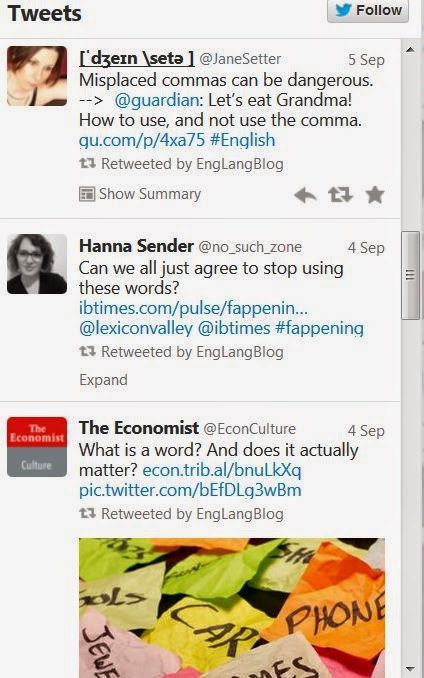This article from Christian Rudder in The Huffington Post offers an analysis of Twitter language in response to the perception that social networking is degrading and/or destroying the English language. It's a common argument and one that has been knocking around for centuries. Ever since there has been technology to communicate - the pencil, the printing press, the mobile phone - there has been someone complaining about its disastrous effects on English.
This article challenges the declinist discourse and suggests that far from dumbing us down and forcing us to communicate very little in 140 characters, Twitter is not that different to other forms of communication:
A team at Arizona State was able to reach beyond word count and length, and into the sentiment and style of the writing, and they found several surprising things: first, Twitter does not change how a person writes. Among the many examples they tracked, if a writer uses “u” for the second person in e-mails or text messages, she will also use it on Twitter. But, likewise, if she generally spells out “you,” she does so every-where -- on Twitter, in texts, in e-mail, and so on. The decision to refer to the first-person singular as "I" or "i" follows the same pattern. That is, a person’s style doesn’t change from medium to medium; there is no “dumbing down.” You write how you write, wherever you write. The linguists also measured Twitter’s lexical density, its proportion of content-carrying words like verbs and nouns, and found it was not only higher than e-mail’s, but was comparable to the writing on Slate, the control used for magazine-level syntax. Everything points to the same conclusion: that Twitter hasn’t so much altered our writing as just gotten it to fit into a smaller place.
Elsewhere, Ammon Shea, whose new book Bad English: A History of Linguistic Aggravation looks well worth a read, has also written a piece for The Huffington Post, considering what's happened to the meanings of the words that were being worried about a hundred or so years ago. Shea finds that words like awful and talented rarely attract complaint these days, but were viewed by some as being totally unacceptable in the past. Meanings change: get over it, seems to be the key message here.
And if you want to help somebody who is actually researching attitudes to "proper" English for a PhD project, Carmen Ebner is collecting views through this link to her online questionnaire, so please take part and give your views. It's particularly good if you are an A2 English Language student and starting to look at language discourses and attitudes to change and variation as part of your second year work.



